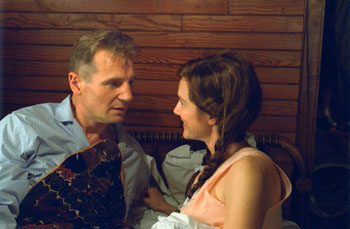![[Metroactive Movies]](/gifs/movies468.gif)
[ Movies Index | Show Times | Santa Cruz | Metroactive Home | Archives ]
Bedside Manner: Liam Neeson and Laura Linney discuss the birds and the bees in 'Kinsey.'
Hoosiers
'Kinsey' is a solid and sensitive biography of sex researcher Alfred Kinsey
By Richard von Busack
Conservative wrath is stirring. Newly aroused and tumescent, the religious right throbs for an example of Hollywood anti-family values upon which to scatter its seeds of doubt. They couldn't pick a more infertile target than the essentially conventional Kinsey.
Director Bill Condon (Gods and Monsters) has called his biography of Dr. Alfred Kinsey a "litmus test" on sexual attitudes, but the film is never repellent. Condon even inserts a character who is a genuine scary pervert for Kinsey to vent his cold disapproval upon. "I didn't think you'd be so square," says the disappointed rapist.
Kinsey reminds us that cheating on a partner makes them feel neglected, that homosexuals ought not to be tortured, that masturbation is natural. The film is sometimes even suspicious of loveless recreational sex. In a wedding scene, Dr. Kinsey's researchers, Indianan grad students from the 1950s, endeavor to talk dirty and end up sounding as stilted as the porno novels of their time.
But Kinsey also derides the hidebound moralizers of the last century, when a Boy Scout leader could counsel fighting sexual urges by keeping your bowels open, reading the Sermon on the Mount and crouching in a bath of cold water. In short, Kinsey is a good liberal movie that plays it down the middle. Hardly anything here to disturb Dr. Phil.
In a smart opening montage about the craft of interviewing, Condon shows us how Kinsey's research team was prepped to go out and ask their personal questions. Going against convention, the scenes of the 1950s are in black-and-white while the flashbacks of Kinsey's New England childhood are in saturated postcard colors. The young Alfred is raised by a strict, unloving minister (John Lithgow). He marries the plain Clara McMillen (Laura Linney) more out of chumminess than passion.
As the pioneer sexologist, Liam Neeson gives a recessive, quiet performance, embodying the doctor's rigor and remote precision. Condon shows Kinsey's early career as a biologist who collected 1 million gall wasps, insects half the size of an ant. The director almost goes expressionist in one shot of this solitary labor: Kinsey mounting the tiny bugs at a desk in a darkened hall, which lengthens as the camera pulls back.
The biologist turns his attentions toward human sexuality when he takes over a hygiene class at the University of Indiana. This begins the first survey of sexual habits, which leads to the 1948 study Sexual Behavior of the Human Male. The book becomes a bestseller, making Kinsey both a celebrity and a pariah. During his studies of the gay community in Chicago--a first recognition of this underworld from a scientific instead of a criminal perspective--the doctor is finally able to act upon his own buried bisexuality.
The film has bursts of humor, as befits a story about sex, an uncomfortable, sometimes ridiculous subject. As Neeson demonstrates Kinsey's sense of purpose and grim ambition, Linney has to be the funny part of the movie: giving a helpless shrug of lashing a kittenish smile when she takes a little revenge on her husband. Linney is fetchingly brisk in her delivery of a Bartlett's Moment, which she delivers so spontaneously it takes a second to register: "Ever since Dr. Kinsey took up sex, I hardly ever see him."
The quality of Kinsey is evident in the supporting cast: Timothy Hutton as a researcher, with a used-car salesman's mustache; the humane but somehow dubious Peter Sarsgaard as the pivotal figure in the Kinseys' marriage, sleeping with both sides of the couple. Tim Curry is a puritanical hygiene professor shoved aside by Kinsey. Curry earned his place in Kinsey: literacy levels being what they are in the United States today, The Rocky Horror Picture Show did as much to spread ideas of sexual freedom as Dr. Kinsey ever did.
The religious-right argument is that Kinsey gave monkey-see-monkey-do humans scientific permission to become perverts, thus thwarting the law of Leviticus that bans such activity. Show-biz law, older than Leviticus, proves there's no such thing as bad press.
One hopes that some of the offended religious groups will set up picket lines around the theaters, thus further promoting this solid, serious and touching story of a scientist bewildered by his own species. As Charles Lindbergh wrote, scientific accomplishment is a path leading to and disappearing in mystery. Kinsey honors the fact that the mystery of sex is too much for any one man or women to unravel, and that Kinsey was a genuine hero for trying.
[ Santa Cruz | Metroactive Central | Archives ]
Copyright © Metro Publishing Inc. Maintained by Boulevards New Media.
For more information about Santa Cruz, visit santacruz.com.
![]()

Photograph by Ken Regan/Camera 5
Kinsey (R; 118 min.), directed and written by Bill Condon, photographed Frederick Elmes and starring Liam Neeson and Laura Linney, opens Friday at the Del Mar in Santa Cruz.
From the November 24-December 1, 2004 issue of Metro Santa Cruz.